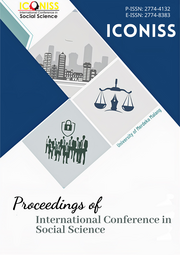Application of the Concept of Restorative Justice by Police and Indigenous Community Institutions on Middle Crimes
DOI:
https://doi.org/10.26905/iconiss.v3i1.9685Keywords:
Minor crimes, Indigenous community institutions and resort police in Fakfak district, Restorative justiceAbstract
The purpose of this article is to examine and analyze the application of Restorative Justice to minor crimes committed by the community by the Indigenous Peoples Institution and the Resort Police in the Fakfak Regency, West Papua and the obstacles experienced by the Police Agencies and Customary Institutions. The method used is an empirical legal research method because it examines the application of policy concepts and the constraints experienced by police agencies and customary institutions. The interview method used was carried out to the Police Agency and traditional elders in Fakfak. The results show that there has been a policy in the form of collaborative coordination or cooperation between the police and customary institutions in handling cases of minor crimes and even extending to moderate crimes such as one example of theft of nutmeg carried out within the family or outside the family, acts of domestic violence, minor mistreatment. The results of the research on the application of justice restoration to minor crimes in accordance with the 1945 Constitution article 18 B paragraphs 1 and 2 and the Republic of Indonesia Police Regulation Number: 8 of 2021, concerning the Handling of Crimes based on Restorative Justice with alternative solutions using Indigenous Peoples Institutions who live in certain areas as an alternative medium for resolving minor crimes. Mild persecution, the results of research on the application of justice restoration to minor crimes in accordance with the 1945 Constitution article 18 B paragraphs 1 and 2 and the Indonesian National Police Regulation Number: 8 of 2021, concerning the Handling of criminal acts based on Restorative justice with alternative solutions using the Indigenous Community Institutions which live in a certain area as an alternative medium for resolving minor crimes. Regarding the Handling of criminal acts based on Restorative justice with alternative solutions using Indigenous Peoples Institutions who live in certain areas as alternative media for resolving minor crimes.Â
Downloads
References
Awi, S. I. M. (2012). Para-Customs as Customary Court Institutions in the Port Numbay Indigenous Law Community in Jayapura City.
Eka, R. I., & Dodo, D. (2021). Existence of customary courts in the criminal law system in indonesia in efforts to renew the national criminal law. PAJOUL: Pakuan Justice Journal of Law.
Government Regulation of the Republic of Indonesia Number 64 of 2008 concerning Amendments to Government Regulation Number 54 of 2004 concerning the Papuan People's Assembly, which is contained in the State Gazette of the Republic of Indonesia of 2008 Number 140.
Jamin, M. (2014). Customary courts, shifting political legal perspectives on the Papua Special Autonomy Law. Yogyakarta: Graha Ilmu.
Law of the Republic of Indonesia Number 2 of 2002 concerning the State Police of the Republic of Indonesia.
Law Number 6 of 20 of 2014 concerning Villages, which is contained in the State Gazette of the Republic of Indonesia of 2014 Number 7.
Law Number 12 of 1969 concerning the Establishment of the Autonomous Province of West Irian and Autonomous Regencies in the Province of West Irian (State Gazette of the Republic of Indonesia of 1969 Number 47, Supplement to the State Gazette of the Republic of Indonesia Number 2907).
Law Number 21 of 2001 concerning Special Autonomy for the Province of Papua, which is contained in the State Gazette of the Republic of Indonesia of 2001 Number 135, Chapter XIV concerning Judicial Powers, Articles 50 and 51.
Law Number 32 of 2004 concerning Regional Government, which is contained in the State Gazette of the Republic of Indonesia of 2004 Number 125.
Law Number 39 of 1999 concerning Human Rights, which is contained in the State Gazette of the Republic of Indonesia of 1999 Number 165.
Law Number 45 of 1999 concerning the Establishment of Central Irian Jaya Province, West Irian Jaya Province, Paniai Regency, Mimika Regency, Puncak Jaya Regency and Sorong City as amended by Law Number 5 of 2000 concerning Amendments to Law Number 45 of 1999 concerning the Establishment of Central Irian Jaya Province, West Irian Jaya Province, Paniai Regency, Mimika Regency, Puncak Jaya Regency and Sorong City Law on the Establishment of West Papua Province.
Law Number 48 of 2009 concerning Judicial Power, which is contained in the State Gazette of the Republic of Indonesia of 2009 Number 157.
News Jubi TV. (2022). Customary Courts Resolve Cases by Reconciling Fellow PapuansMay 17, 2022.
Online Law. (2005). Papuan Customary Court, Form of Recognition of Living Law, The inclusion of the 'law that lives in society' clause into the Draft Criminal Code emphasizes the recognition of customary justice, August 24, 2005.
Rato, D. (2019). Customary law on land and debt. Yogyakarta: Laksbang Presssindo.
Perdasus 20 of 2008 concerning Customary Courts in Papua, which is contained in the Regional Gazette of the Papua Province of 2008 Number 20.
Regulation of the State Police of the Republic of Indonesia Number 8 of 2021 concerning the Handling of Crimes Based on Restorative Justice.
Setiady, T. (2018). Digest of Indonesian Customary Law, in literature study. Bandung: Afabeta.
Sunggono, B. (2002). Legal research methods. Jakarta: Rajawali Press.
The 1945 Constitution Articles 18 and 24 paragraphs (1 and 2).
Downloads
Published
Issue
Section
License
Authors who publish in this journal agree to the following terms:
(1)Â Copyright of the published articles will be transferred to the journal as the publisher of the manuscripts. Therefore, the author confirms that the copyright has been managed by the journal.
(2) Publisher of Proceedings of International Conference in Social Science is the University of Merdeka Malang.
(3) The copyright follows Creative Commons Attribution–ShareAlike License (CC BY SA): This license allows to Share — copy and redistribute the material in any medium or format, Adapt — remix, transform, and build upon the material, for any purpose, even commercially.

